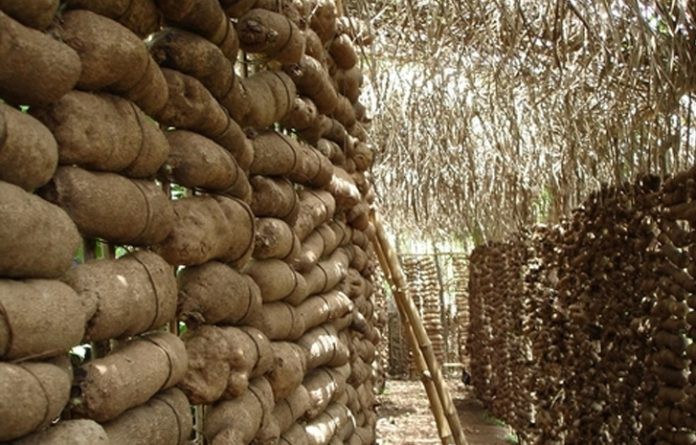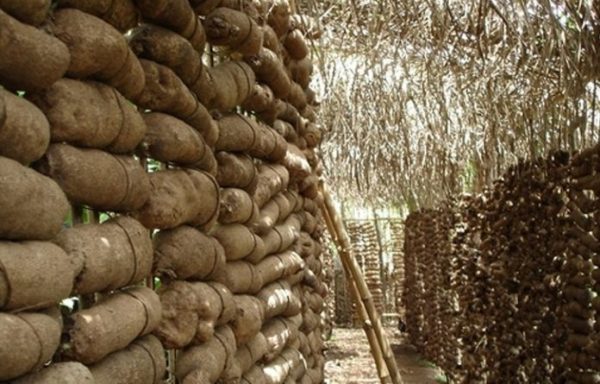Agriculture is still the single biggest contributor to Nigeria’s Gross Domestic Product. In the first quarter of 2021, it constituted almost 22% of the country’s economic output, valued in monetary terms.
Read more about Did you know?
Much of what’s produced in this sector ends up on the plates of Nigerians. Subsistence and commercial farmers alike grow items like yam, cassava, and rice that are shipped to markets close and far away, where they are in turn sold to final consumers. These items sustain the millions of people who toil daily to build the broader economy.
In this article, we’ll have a look at the top commodities grown by Nigeria’s farmers, in terms of absolute quantities.
Nigeria’s Biggest Agricultural Commodities
These commodities have posted the highest output of any agricultural commodities in Nigeria.
Cassava
According to the Food and Agriculture Organization (FAO), Nigeria produced 59.5 million tons of cassava in 2018, the largest quantity put out by any county in the world. Top producing states include Anambra, Delta, Benue, Edo, Cross River, and Rivers.
A lot of it goes into making garri, a local staple food. There’s also a growing industrial use; derivatives are used to make starch, animal feed, cosmetics, and medicine.
Yam
Nigeria’s farms yielded about 50 million tons of yams in 2018, according to the FAO’s data. Some of the biggest producing states were Benue, Taraba, Niger, and Kaduna. Cassava tubers are often sliced and cooked by boiling, roasting, or frying.
Maize
Maize is grown across Nigeria and used for a variety of purposes. Besides being consumed as food, it is also used as input by flour mills, bakeries, and breweries, to make flour, bread, and drinks. An estimated 11 million tons of maize is grown in Nigeria per year, making it one of the top 20 biggest producers of the commodity in the world.
Oil Palm Fruit
Oil palm fruit, the material from which palm oil is extracted, is grown in many parts of southern Nigeria. About 9.6 million tons of this commodity is collected from local farms every year; 1.2 million tons of palm oil is derived from these fruits annually, the fifth-largest quantity of any country in the world. Delta, Akwa Ibom, Rivers, Ondo, Abia, and Imo are among the top producers of palm oil in Nigeria.
Rice
Rice is a staple food for large parts of the country. It’s an essential ingredient for many dishes in the north and south, although a lot of the cultivation happens in the former (in states like Kebbi, Kano, and Jigawa). As of 2018, Nigeria’s rice yield was 8.4 million tons, making it the thirteenth-highest producer of paddy rice in the world.
Sign up to the Connect Nigeria daily newsletter
Fresh Vegetables
Some of the more widely cultivated vegetables in Nigeria include okra, melon, hibiscus (for ‘zobo’), Corchorus (Ewedu), and baobab leaves. Taken together, the quantity of these vegetables harvested from local farms annually exceeds 8 million tons. Some of them are grown for their leaves; others (like hibiscus) for their edible extracts.
Sorghum
Sorghum is a popular crop in northern Nigeria, where it’s grown for food, fodder, feed, and fuel. It’s also used in the industrial production of gluten-free foods and drinks. The FAO says that about 6.8 million tons of sorghum were produced locally in 2018. Some of the leading producers were Kano, Sokoto, Plateau, Gombe, Zamfara, and Kaduna.
Groundnut (With Shell)
Groundnut is commonly consumed as a snack. It’s also the source from which groundnut oil is extracted. This oil is a cooking ingredient, as biofuel, and in shampoos, insecticides, and glue, among other things. Nigeria yields about 4.6 million tons of groundnuts per year, from states like Jigawa, Kano, Bauchi, Taraba, Plateau, Yobe, and Borno.
Citrus Fruits
Oranges, tangerine, lime, lemon, and other citrus fruits are popular across Nigeria and are grown in the middle belt and southern parts of the country. About 4.1 million tons of these fruits are harvested from Nigeria’s farms annually.
Sweet Potatoes
Sweet potatoes are one of a host of root and tuber crops consumed by the Nigerian populace. It is favoured for its sweet taste, which makes it distinct from other crops in its category. Nigeria yields an estimated 4 million tons of sweet potatoes per year, among the largest quantities reported in Africa.
Final Words
Nigeria has rich agricultural potential. Despite its many constraints, it leads the world in the cultivation of many crops. It could achieve a lot more with better cultivation techniques, technologies, and support from the government and private sector concerns.
Featured Image Source: Medium
Got a suggestion? Contact us: [email protected]


